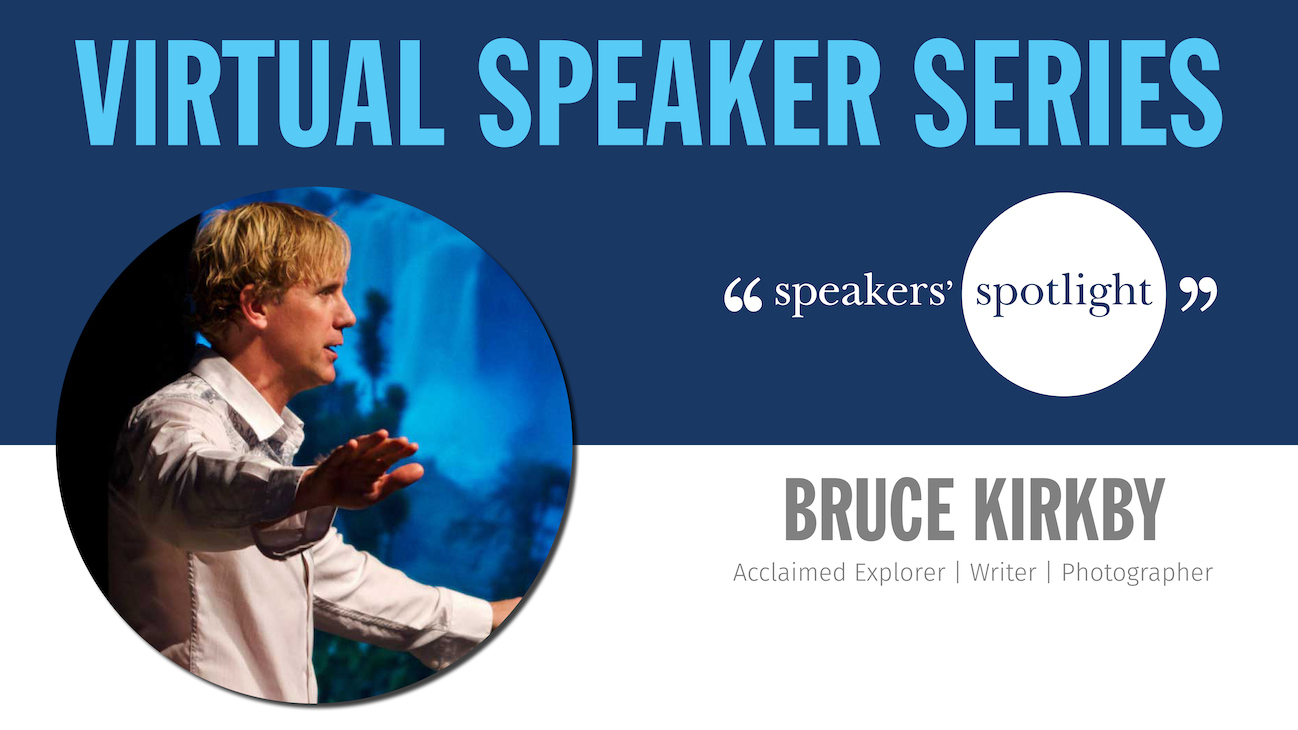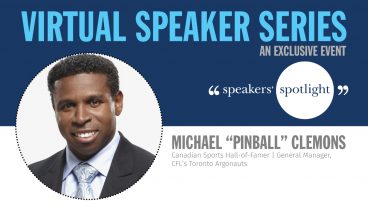Joining us for this week’s Virtual Speaker Series session, acclaimed explorer and travel writer Bruce Kirkby brought stories from some of his adventures around the world and the insight he’s gained from those incredible experiences. Specifically, Bruce spoke on the importance of the often misunderstood idea of grit, and how we can perform under pressure and conquer obstacles through a framework of purpose, practice, and process.
*Bruce provided us with a helpful infographic regarding his purpose, practice, process breakdown that you can find here*
Bruce began by talking about the past 12+ months of pandemic life from his perspective as a veteran speaker and expedition leader. He said that he saw this stretch of time as a real “inflection point” for people and organizations that he’s been working with, finding massive levels of distraction, disruption, and burnout. This new norm has highlighted the need for better understanding the elusive idea of grit. Put simply, he said, his approach to grit is about having a mental framework built on a set of habits and routines that can help organizations, teams, and individuals alike tap into grit.
One of Bruce’s first points was to talk about the difference between grit and resilience, as these are two terms that regularly go hand-in-hand and can seem interchangeable. From his perspective, resilience is a short-term act while grit is a long-term approach. Resilience is a crucially important skill but it’s the reflex in the moment when we face a difficult challenge. Grit, Bruce said, is more about the acts of resilience stretching out over months and years—and the preparation that takes place around those momentary obstacles.
This segued into Bruce’s first of several adventure anecdotes during the presentation. He was on the northern tip of Vancouver Island, preparing at Port Hardy with a partner to set out on a paddle board excursion around Cape Scott. As far as they knew, no one had attempted this journeying across this treacherous ocean territory using such lightweight gear before. After initially making progress, they eventually encountered a massive storm that made safe progress impossible. They camped on the shore for three days, listening to the forecasts and trying to get a measure on the upcoming weather. Finally, they found a tiny window of opportunity where there was a break in the storm and they believed they could make the stretch (which involved many hours on the ocean). It required them to wake and set out from camp at 4:00 a.m., and despite uncertainty they finally decided that they’re training, and experience prepared them to face the day. While they encountered wild ocean conditions that Bruce said he had never faced before, they succeeded in their journey.
While Bruce is excited to share exciting stories like these, he understands that for many the reaction is “That’s not for me!” But, he said, his takeaways are as applicable for anyone with ambitions and ideas. You don’t have to be taking on extreme outdoor challenges to encounter obstacles and unexpected issues, whether in your work or daily life.
But what if we find we can just face these challenges and obstacles by pushing ourselves to the limit, to grind out that project over the weekend or to catch up over the course of a few all-nighters? Bruce said this is what we usually call grind. Grinding is our hustle culture, that’s lionized in modern western society—especially in corporate culture. There are times to grind, Bruce said, and it’s often in our instincts to go to the grind mentality, but it’s not possible for it to work in the long-term. As Bruce put it, “We can choose to grow better or grow bitter.”
Whereas grind is about straining ourselves to push through a difficult moment, Bruce said that grit is really about overcoming serious obstacles with a sense of ease or grace. Not that it will be easy necessarily, but about entering a flow state where we can tap into our purpose, practice, and process to approach challenges with hope and optimism rather than tireless struggle.
Bruce’s next adventure story took us to the north of Canada. He called it the last frontier, and a demanding and unforgiving but also incredibly beautiful landscape. It’s there that Bruce leads 12 day rafting trips each summer, through a program that often brings people – usually children or elderly folks – who have little outdoor experience. On one particular trip several years ago, Bruce encountered a Swiss woman in her 70s named Marjorie. She had been surprised by her husband with plans for the trip, and initially didn’t want to go. Unfortunately, her husband passed away before the trip began and so Marjorie took his ashes and flew to Canada to join Bruce and the crew. Even once she arrived she was overwhelmed and uncertain, but Bruce convinced her to try and stick with it.
Once they were actually in the wilderness a few days into the trip, Marjorie left the main campsite to use the latrine. After taking longer than usual to return, Bruce and the other organizers set out to see if Marjorie had become lost or injured. They couldn’t find her anywhere nearby and even called in a helicopter to help with the search. Later the next day, she was found over 5km away, shaken but in one piece. It turned out that she had left her glasses at camp and had become turned around in the woods, losing track of the camp and eventually heading off in the wrong direction. Despite being a novice adventurer, she managed to make a basic fire and shelter. She told Bruce, she felt she must survive to ensure her husband’s ashes (left in a shoebox in her tent) were properly scattered.
Bruce said this incredible first-hand example of someone overcoming an surprise challenge, shows how we are often grittier than we think and that it shows us the first part of the three elements to achieving grit: purpose. Purpose can be a personal cause, a goal or ambition, or simply the desire to do positive things in the world. That purpose gives us the drive to stay optimistic and enthusiastic. It’s also important, Bruce said, to share our purpose with our friends and teammates. It takes courage to be vulnerable, but it provides us with support and accountability.
More stories followed, as Bruce then moved onto the importance of practice. This is where we take the time to prepare our skills and to consider where we might be deficient or might have flaws. He said that practice is the stuff that is happening in the background, that lives in the shadows all adding up in the moments that matter. He spoke about the “fallacy of talent”, something we often see when looking at high performance athletes. We see them achieving at their peak but we don’t see the work that was happening for the other 99% of the time. Talent is common, Bruce said, but consistent practice is rare.
Bruce then moved onto the third and final aspect of grit: process. He said that the distractions of the modern world are unending, but having a good process provides us with the ability to continue to do important things in the face of distraction. This is one of the reasons that Bruce is such a proponent for outdoor expeditions, as it gives us a chance to be free of distractions while focusing on the essentials of water, food, and shelter. It gives us a chance to see what we can accomplish when focused with such core aspects of life. Bruce said that it’s rare we can tackle the big challenges in life with a quick burst of energy, so having an effective process is key to that long-term success.
Wrapping up, Bruce took a few quick questions from the virtual audience. One of the most relevant was: “What part do grit and resilience play when our ambitions or goals don’t come true?” Bruce offered that the effort of self-improvement and dedication to purpose, practice, and process is always useful, no matter what tasks or challenges we’re currently facing. He said that you never know how it might help you face another challenge, because you never know where the next opportunity will lie.
Bruce Kirkby lives life on the edge. An acclaimed explorer, travel writer and television host (with a degree in engineering physics), his travels have taken him from the world’s highest mountains to the wildest rivers and driest deserts. He draws on these experiences to provide real-world, practical lessons on resilience, risk management and change leadership, helping individuals and organizations confront fears, embrace change and find lasting success.
Speakers’ Spotlight has been offering virtual presentations since 2009. We work with a range of speakers who are comfortable with presenting virtually on a variety of topics. If interested, contact us for more information.




